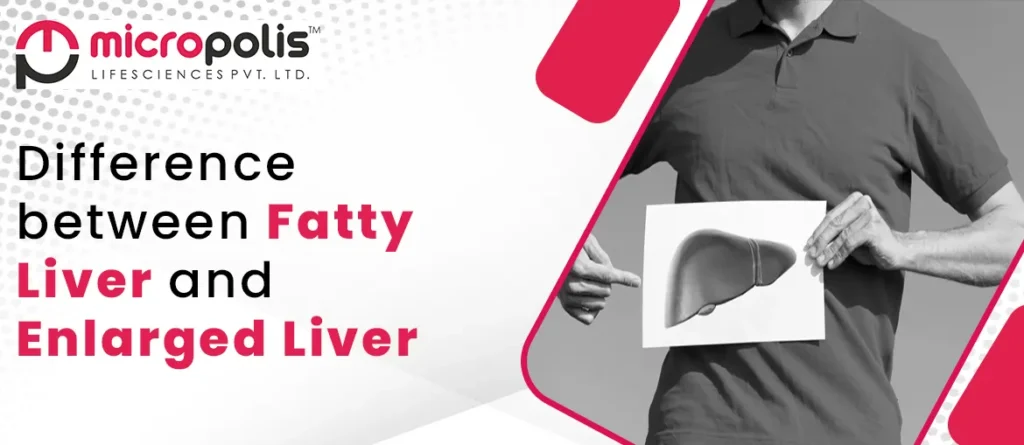The liver is the largest internal organ in our body. Several important functions of the body are performed by the liver, including the coagulation of blood, the removal of toxins from the blood supply, and maintaining healthy blood sugar levels. It also performs other functions that are vital for the survival of humans. Fatty liver and enlarged liver are two conditions that affect the function and structure of the liver. Fatty liver is the condition that occurs due to the storage of extra fat in the liver, while enlarged liver is the medical condition that occurs due to the enlargement of the liver.
Fatty liver disease:
Fatty liver disease, also known as hepatic steatosis or diffuse hepatic steatosis, is a very common condition related to the accumulation of excess fat in the liver. Usually the liver has some fat, but when the fat level exceeds 5% of liver cells, it can be problematic. The liver is the most frequent location for fat buildup, as it plays a very important role in the metabolism of fats. Researchers have anticipated that within the next two decades, liver transplants caused by hepatitis C and excessive alcohol consumption will be outnumbered by those resulting from fatty liver disease causing cirrhosis.
Types of Fatty Liver Disease:
Types of liver disease can be categorized as:
- Non-alcoholic Fatty Liver Disease (NAFLD).
- Alcoholic Fatty Liver Disease (AFLD).
Non-alcoholic Fatty Liver Disease (NAFLD):
It is a known fatty liver disease. In this disease, fat accumulates in the liver without much alcohol intake. Over the years, a lot of damage can be caused by this.
This condition has four further stages:
- Non-alcoholic Fatty Liver (NAFL).
- Non-alcoholic Steatohepatitis (NASH).
- Fibrosis.
- Cirrhosis.
Alcoholic Fatty Liver Disease (AFLD):
Alcoholic Fatty Liver Disease, or alcoholic steatohepatitis, is a liver condition caused by excessive consumption of alcohol. When you consume alcohol, the liver helps digest and metabolize most of it in order to remove it from your system. However, in order to do this, the body executes a breakdown process, which further leads to the generation of harmful compounds that can harm the liver, cause inflammation, and damage the body’s inborn defenses.
This condition has three further stages:
- Alcoholic Fatty Liver or Steatosis.
- Alcoholic hepatitis.
- Fibrosis.
- Alcoholic cirrhosis.
Causes of Fatty Liver Disease:
There are various causes of fatty liver diseases, including:
- Hyperlipidaemia: Having more fat than the liver’s capacity. Conditions that cause hyperlipidemia are:
- Obesity.
- Diabetes.
- Inherited hyperlipidaemia.
- Liver cell damage: Due to damage to cells in the liver, the liver is not able to process the fat. Its causes are:
- Starvation.
- Chronic illnesses.
- Alcoholic liver disease (the most prevalent).
- During late pregnancy, an acutely fatty liver.
- Reye’s syndrome.
- Hepatotoxins.
- Drug-induced liver cell injury.
Symptoms of Fatty Liver Disease:
Symptoms of fatty liver disease may include:
- Loss of appetite.
- Vomiting.
- Low energy.
- Weight loss.
- Jaundice.
- Skin itching.
- Bloating.
- Confusion.
- Intestinal bleeding.
- Renal failure.
- Fluid buildup in the abdomen.
- Enlarged spleen.
- Fatigue.
- Edema in the legs and feet.
- Uneasiness in the abdomen.
Enlarged Liver Disease:
The liver that is larger than normal livers is called an enlarged liver. The medical term used for this is hepatomegaly. More than a disease, it is an underlying problem, such as congestive heart failure, liver disease, or cancer. The liver plays a vital role by cleaning your blood and removing harmful chemicals from the body. A swollen liver can also be a symptom of hepatitis. Certain conditions, such as infection, parasites, congenital heart disease, tumors, heart failure, and metabolic disturbances, may cause an enlarged liver.
Causes of an Enlarged Liver:
Many conditions can be reasons for an enlarged liver, including:
- Liver diseases:
- Hepatitis.
- Nonalcoholic fatty liver disease.
- Alcoholic fatty liver disease.
- Fluid-filled pockets in the liver (liver cysts).
- Non-cancer liver tumors, including hemangioma and adenoma.
- Obstruction of the gallbladder or bile ducts.
- Cancers:
- Cancer that spreads to the liver, but is initially in other parts of the body.
- Leukemia.
- Liver cancer.
- Lymphoma.
- Heart and blood vessel problems:
- Budd-Chiari syndrome (blockage of the veins).
- Heart failure.
- Pericarditis, which means inflammation of the tissue surrounding the heart.
Symptoms of Enlarged Disease:
Symptoms of an Enlarged Liver:
- Abdominal pain.
- Nausea and vomiting.
- Fatigue.
- Jaundice.
- Discomfort in the belly.
- Feeling of fullness.
- Loss of weight.
To summarize it all, the liver is the largest solid organ in the body, playing a vital role. Fatty liver and enlarged liver are two conditions that can cause huge problems in the liver. Both of these conditions can be recognized and taken care of by knowing about their symptoms and causes. When these conditions start to hinder your daily life, contact your healthcare provider.


